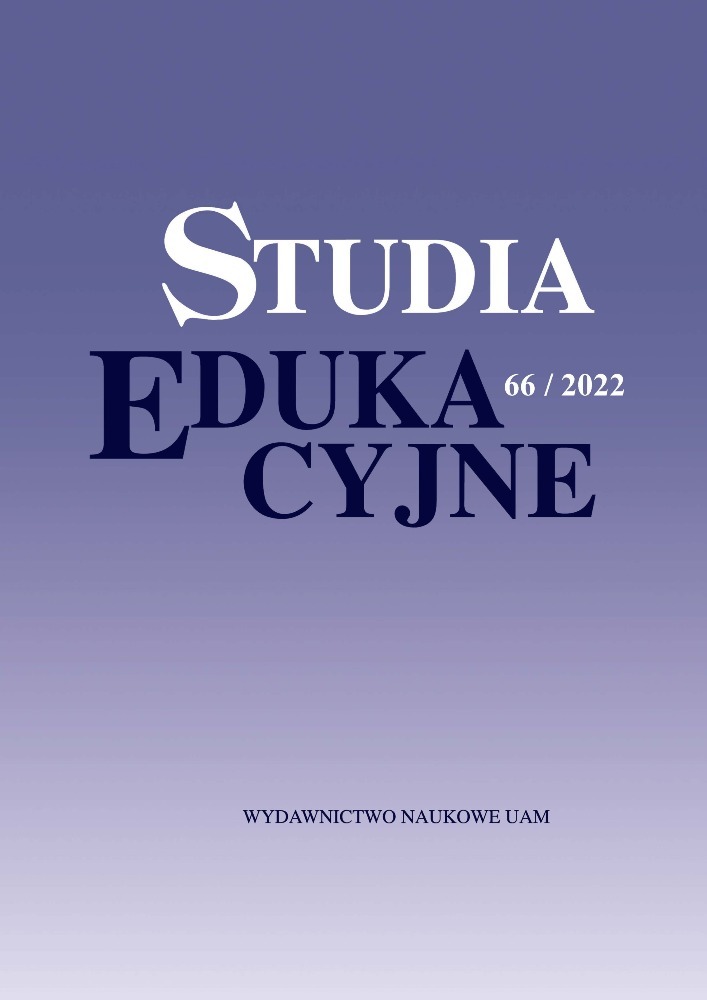Abstrakt
The article presents a new approach to comparative education in the Polish comparative discourse, based primarily on the ideas of pedagogical constructivism, opening a discussion on a new method- ological paradigm, which is the place of historical context and memory in comparative research. In Polish comparative education there is a tendency to attach less importance to the role of history and memory for a comprehensive grasp of the meaning of the phenomena analyzed and the search for answers to important cognitive problems. The traditional approach is focused on the present and fu- ture perspective and this is how educational problems are perceived in the discourse of comparative education. Taking into account the importance of historical thinking in the methodology of compara- tive education is important insofar as it shows a wide context and helps understand rather than only present phenomena. The contextual analysis, including the embedding of phenomena in their logic of historical events, is the basic task of comparative education.
Bibliografia
Archer M.S., Realist Social Theory: The Morphogenetic Approach, Cambridge University Press, Cambridge 1995. DOI: https://doi.org/10.1017/CBO9780511557675
Bray M. ed., Comparative Education. Continuing Traditions, New Challenges, and New Paradigms, Springer-Science+Business Media, Dordrecht 2007.
Bray M., Adamson B., Mason M., eds., Comparative Education Research: Approaches and Methods, Springer, Hong Kong – Dordrecht 2007. DOI: https://doi.org/10.1007/978-1-4020-6189-9
Bray M., Thomas R.M., Levels of comparison in educational studies: Different insights from dif- ferent literatures and the value of multilevel analyses, Harvard Educational Review, 1995, 65, 3. DOI: https://doi.org/10.17763/haer.65.3.g3228437224v4877
Cowen R., Comparing futures or comparing pasts? Comparative Education, 2000, 36. DOI: https://doi.org/10.1080/713656619
Crossley M., Reconceptualising comparative and international education, Compare: A Journal of Comparative Education, 1999, 29. DOI: https://doi.org/10.1080/0305792990290305
Erll A., Kultura pamięci. Wprowadzenie [Memory in culture], transl. A. Teperek, Wydawnict- wa Uniwersytetu Warszawskiego, Warszawa 2020.
Foucault M., Aesthetics, metho, and epistemology, New Press, New York 1994.
Heinrich D., Die Einheit der Wissenschaftslehre Max Webers, J.C.B. Mohr Verlag, Tübingen 1952.
Jaspers K., The Question of German Guilt, Fordham University Press, New York 2001.
Mill J.S., System logiki dedukcyjnej i indukcyjnej [A System of Logic: Raciocinative and Inductive], tom 1, Państwowe Wydawnictwo Naukowe, Warszawa 1962.
Melosik Z., Poststrukturalizm jako teoria życia społecznego (możliwości i kontrowersje) [Post-structuralism as a theory of social live style. Opportunities and controversies], Kultura Współczesna, 1997, 1(13).
Olick J.K., Joyce Robbins J., Badania nad pamięcią społeczną: od „pamięci zbiorowej” do socjologii historycznej praktyk pamięciowych, [in:] (Kon)teksty pamięci. Antologia, ed. K. Kończał, Narodowe Centrum Kultury, Warszawa 2014.
Watson K., Memories, models and mapping: The impact of geopolitical changes oncomparative
studies in education, Compare: A Journal of Comparative Education, 1998, 28.
Weber M., Gesammelte Aufsätze zur Wissenschaftslehre, Johann Winckelmann, J.B.C. Mohr (Paul Siebeck), Tübingen 1982.
Wilson D., The Future of Comparative and International Education in a globalised World, [in:] Comparative Education. Continuing Traditions, ed. M. Bray, New Challenges, and New Paradigms, Springer-Science+Business Media, Dordrecht 2003.
Licencja
Prawa autorskie (c) 2023 Renata Nowakowska-Siuta

Utwór dostępny jest na licencji Creative Commons Uznanie autorstwa 4.0 Międzynarodowe.

